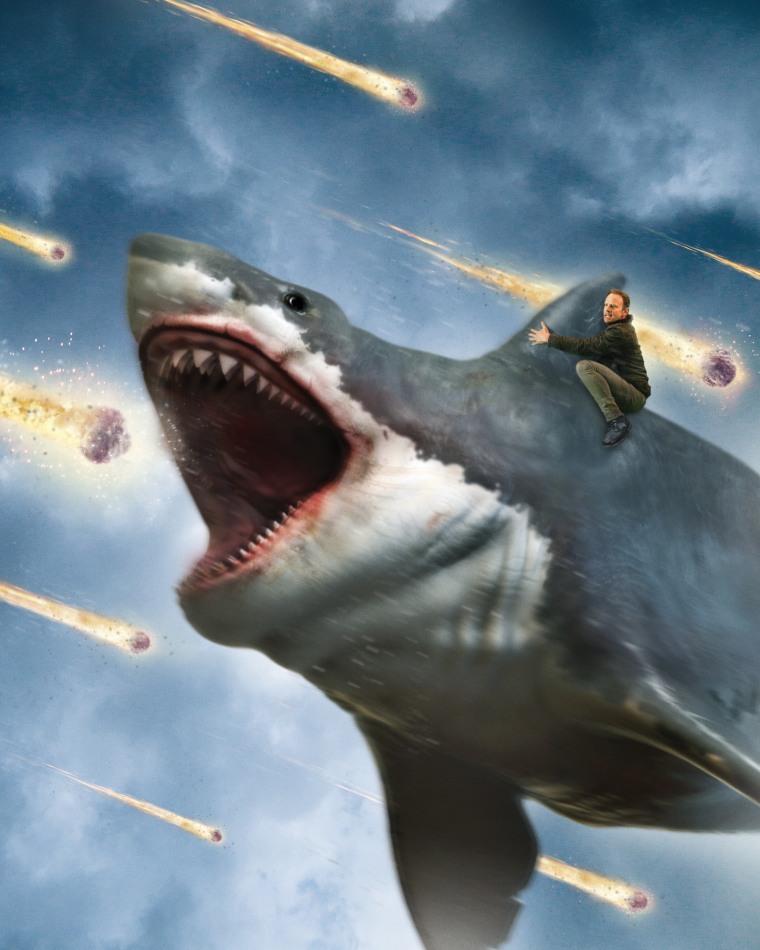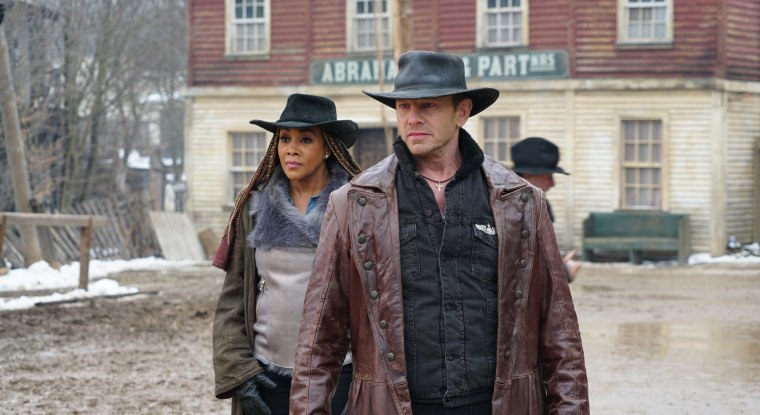I have seen crimes against sharks that, once seen, can never been unseen. I have seen sharks shot with handguns. I have seen sharks shot with mini-guns. I have seen sharks shot with grenades, shot with rocket launchers and slashed with swords.
I have seen other crimes against sharks. I have seen badly-rendered CGI sharks that, impossibly, can do the equivalent of a handbrake turn in water. I have seen CGI sharks that fall 500 meters and inexplicably bounce. I have seen many, many — too many — sharks that don’t appear to need gills. I have seen all these things and more, not to mention moments of dialogue so cringe-inducing as to cause my cervical vertebrae to detach from one another, causing immense agony.
Did I mention chainsaws? Those too. And, of course, very questionable meteorology.
You will have also been witness to such crimes if you have been following the B-movie franchise, "Sharknado." If you don’t know what "Sharknado" is, all you need to know is that the tagline for the first film was “Enough said!” so, enough said. But now, after five films, the Sharknado franchise ends on Sunday with its sixth installment, "The Last Sharknado: It’s About Time" which sounds a little too on the nose.
At this point, you might be expecting a paid-up member of the science fraternity (me) to be celebrating the end of a chapter of film history that has painted sharks in a truly terrible and highly unscientific light. But you won’t read that from me because, inexplicably, I have ended up falling in love with these ridiculous films and the genre of “sharksploitation” cinema that they have come represent.
Why do I love these films so? Because, like watching someone doing tricks with a hacky sack, it is incredible to see one thing (killing CGI sharks) done in so many brilliantly creative and over-the-top ways. I am not condoning the actual killing of sharks by enjoying the genre, though, because the creatures in the movie aren’t sharks but merely Hollywood perversions of sharks. Real sharks are capable predators, after all, and communicative creatures — diverse, elusive, behaviorally complex and, frankly, beautiful animals.
Hollywood sharks are nothing like that: They represent real sharks the same way Dracula's diminutive form represents bats.
The Sharknado franchise is just one of many recent B-movie shark gems whose titles speak volumes about the sharksploitation phenomenon. Recent shark-related films include "Avalanche Sharks" (2014), "Dinoshark" (2010), "Ghost Shark" (2013), "Shark Night" (2011), "Sharktopus" (2010), "Snow Shark" (2012) and the memorable Mega Shark franchise which includes "Mega Shark Versus Giant Octopus" (2009) (which is the one where a monster shark jumps so high out of the water that it bites a plane out of the sky). Plus, there’s "Two Headed Shark" (2012), "Three Headed Shark" (2015) and "Five Headed Shark" (2017) and the slightly-more-cinematic spectacle (but no less B-movie) "The Meg," which stars Jason Statham.
If the sixth Sharknado really is the end of the franchise (and I’m not convinced it is), shark film franchises are like Whac-a-Mole, have no fear: If one goes away, another will pop-up in a new form. All Hollywood has to do is chum their cinematic waters with sharks and we will turn up in droves under the boat. Goodbye "Sharknado," hello "Spider Sharks" or "Clown Sharks" or, well, you get the idea.
The reasons for this are as old as time: At their best, monster-flicks like these give us the safety to explore our fears and have us leaving a cinema feeling like happy survivors.
But sharks flicks have an added appeal. Bluntly, sharks are unlucky enough to have uniform hairless skin, apparently “dead eyes” (to humans) and faces that remain mostly expressionless. That trio of features make sharks especially easy for low-skilled and low-paid CGI animators to master. In other words, in the digital age sharks have become Hollywood’s cheapest monster and, for that reason, we should expect more.

But there is a certain irony to all of this: While sharks flourish as monsters on screen, the fate of wild sharks has never looked more uncertain. At the present time, one quarter of all known sharks and ray species are threatened by extinction, and 25 species are listed as Critically Endangered. In total, we humans may kill as many as 100 million sharks a year through commercial and recreational hunting, although the true figure could be even higher if we were able to monitor the actions of illegal fisheries of which there are many. There are rivers of blood in shark-infested waters, and none of it is ours. That’s a special kind of horror, right?
"The Meg" touches on this human-made horror — our killer shark takes out an illegal fishery at one point — but that dark message rarely, if ever, features in sharksploitation movies. It's a shame because, in recent years, shark scientists are uncovering more and more about these animals, and discovering incredible insights into their evolutionary history, their complex behaviors and the vital role that they play in maintaining healthy ocean ecosystems.
I would argue that there is space in the genre to touch or build upon any one of those points without threatening the central conceit of a good sharksploitation film. Just as zombie films aren’t always about zombies, it’d be nice if at least some shark films weren’t about sharks. At the very least, in the reflection of the apparently lifeless eyes of the shark it would be good to catch a glimpse of the monstrousness of humans a bit more somehow.
So, as the Sharknado franchise comes to an end, other sharksploitation films will surely follow, many of which will continue to be deliciously awful. I just hope that at least some will allow us something new to chew on. The cinematic waters are in danger of becoming too murky from all the Hollywood chum.
Perhaps, as the Sharknado chapter closes, we’re ready for something new. I can’t be the only one wishing for something that little bit more … meaty to sink my teeth into.
Jules Howard is a zoologist, wildlife commentator and author. He writes regularly for The Guardian and his books include "Sex on Earth" and "Death on Earth" (Bloomsbury Sigma).




